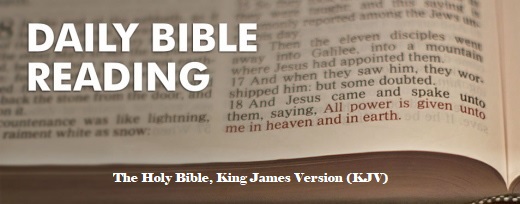The Daily Readings
FRIDAY, September 4, 2020
Psalm 149; Exodus 10:21-29; Romans 10:15b-21
The Holy Bible, King James Version (KJV)
Today's Verse-of-the-Day: 2 Timothy 1:13-14
Hold fast the form of sound words, which thou hast heard of me, in faith and love which is in Christ Jesus. That good thing which was committed unto thee keep by the Holy Ghost which dwelleth in us.
Today's Readings:
Sing praise in the congregation
1 Praise ye the Lord. Sing unto the Lord a new song, and his praise in the congregation of saints.
2 Let Israel rejoice in him that made him: let the children of Zion be joyful in their King.
3 Let them praise his name in the dance: let them sing praises unto him with the timbrel and harp.
4 For the Lord taketh pleasure in his people: he will beautify the meek with salvation.
5 Let the saints be joyful in glory: let them sing aloud upon their beds.
6 Let the high praises of God be in their mouth, and a two-edged sword in their hand;
7 To execute vengeance upon the heathen, and punishments upon the people;
8 To bind their kings with chains, and their nobles with fetters of iron;
9 To execute upon them the judgment written: this honour have all his saints. Praise ye the Lord.
Another plague: darkness
10:21 And the Lord said unto Moses, Stretch out thine hand toward heaven, that there may be darkness over the land of Egypt, even darkness which may be felt.
22 And Moses stretched forth his hand toward heaven; and there was a thick darkness in all the land of Egypt three days:
23 They saw not one another, neither rose any from his place for three days: but all the children of Israel had light in their dwellings.
24 And Pharaoh called unto Moses, and said, Go ye, serve the Lord; only let your flocks and your herds be stayed: let your little ones also go with you.
25 And Moses said, Thou must give us also sacrifices and burnt offerings, that we may sacrifice unto the Lord our God.
26 Our cattle also shall go with us; there shall not an hoof be left behind; for thereof must we take to serve the Lord our God; and we know not with what we must serve the Lord, until we come thither.
27 But the Lord hardened Pharaoh's heart, and he would not let them go.
28 And Pharaoh said unto him, Get thee from me, take heed to thyself, see my face no more; for in that day thou seest my face thou shalt die.
29 And Moses said, Thou hast spoken well, I will see thy face again no more.
God reaches out to erring Israel
10:15b How beautiful are the feet of them that preach the gospel of peace, and bring glad tidings of good things!
16 But they have not all obeyed the gospel. For Esaias saith, Lord, who hath believed our report?
17 So then faith cometh by hearing, and hearing by the word of God.
18 But I say, Have they not heard? Yes verily, their sound went into all the earth, and their words unto the ends of the world.
19 But I say, Did not Israel know? First Moses saith, I will provoke you to jealousy by them that are no people, and by a foolish nation I will anger you.
20 But Esaias is very bold, and saith, I was found of them that sought me not; I was made manifest unto them that asked not after me.
21 But to Israel he saith, All day long I have stretched forth my hands unto a disobedient and gainsaying people.
Optional parts of the readings are set off in [square brackets.]
The Bible texts of the Old Testament, Epistle, and Gospel lessons are from The Holy Bible, King James Version (KJV).
The Daily Bible Readings are selected from the Revised Common Lectionary Daily Readings, a three-year cyclical lectionary. We are currently in Year A. Beginning with the first Sunday of Advent in 2020, we will be in Year B. The year which ended at Advent 2019 was Year C. These readings complement the Sunday and festival readings: Thursday through Saturday readings help prepare the reader for the Sunday ahead; Monday through Wednesday readings help the reader reflect and digest what they heard in worship. Revised Common Lectionary Daily Readings, copyright © 2005 Consultation on Common Texts. www.commontexts.org
The Daily Readings for FRIDAY, September 4, 2020
Psalm 149; Exodus 10:21-29; Romans 10:15b-21 (KJV)










